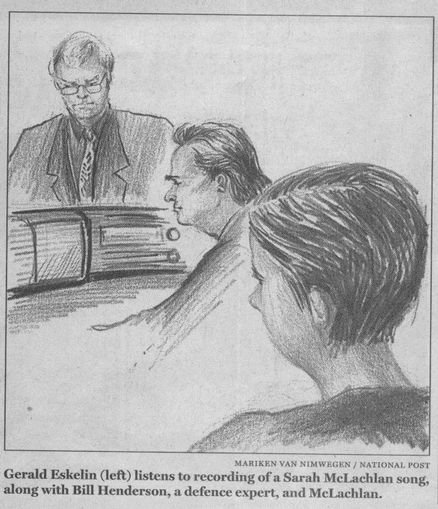|
|
Court given a music lessonExpert Witness SingsMusicologist testifies McLachlan song radically improvedBy Neal Hall 
VANCOUVER - A music expert sang some of his testimony in a Vancouver courtroom yesterday while Canadian popular music superstar Sarah McLachlan tapped her foot in time to the music played at her copyright infringement trial. Ms. McLachlan's lawyer even got in on the act, playing Mozart on an electronic keyboard. The trial is turning into an musical event, with Ms. McLachlan expected to perform next week when she takes the witness stand. At issue is who wrote four of the songs on Ms. McLachlan's 1988 debut album, Touch. Darryl Neudorf, 34, a Vancouver record producer and former drummer, claims he co-wrote the songs Steaming, Sad Clown, Vox and Strange World during the three months he spent helping Ms. McLachlan develop and produce songs in early 1998. Ms. McLachlan claims she wrote all the songs on her first album, but Vancouver barber and part-time musician Darren Phillips is credited for co-writing two songs. Vancouver record company Nettwerk Productions had hired Mr. Neudorft in late 1987 to help Ms. McLachlan, who at the time was 19 and had never written a complete song before. She had just moved to Vancouver from Halifax after singing a five-record deal with Nettwerk in October 1987. Mr. Neudorf is suing Ms. McLachlan, Nettwerk, her manager, Terry McBride, and partners Mark Jowett and Rick Arboit. Mr. Neudorf claims he was not adequately compensated for helping produce and write songs on Touch, of which 624,000 copies have been sold. Most of yesterday's testimony centered on one song in dispute - Steaming. Three versions were played for Mr. Justice Bruce Cohen of the B.C. Supreme Court, who is hearing the case without a jury. The first version of Steaming was on a tape called the Sarah Project, sent to Mr. Neudorf before he became involved. Jennifer Cokie, the lawyer who represents Ms. McLachlan and the other defendants, conceded it was an "atrocious" copy because of the poor sound quality. While the tape was being played, Ms. McLachlan turned to reporters sitting behind her and whispered: "This is where it gets embarrassing." She was heard warbling on the tape but the words were almost unintelligible. The next tape played was the version Mr. Neudorf worked on before Ms. McLachlan entered the recording studio in March 1988. It was referred to as the Touch Demo. The final version was a tape of the song on the commercial release of Touch. Mr. Neudorf's music expert, Los Angeles musicologist Gerald Eskelin, who has been nominated for two Grammy Awards for his work as director of the L.A. Jazz Choir, gave a detailed analysis of the changes to the song. "One-one-one, flat 6, E-flat," Mr. Eskelin sang, pointing out the structure of the song in the original version. He noted the song was "immensely improved" during the time Mr. Neudorf worked on Steaming. His conclusion: that Mr. Neudorf's involvement led to about 90% of the original song being changed. Ms. Conkie, in her cross-examination of Mr. Eskelin, tried to suggest what Mr. Neudorf did was not songwriting but arranging and producing. "Absolutely not," replied Mr. Eskelin. He said the three months' work on the songs between Mr. Neudorf and Ms. McLachlan in a backroom of Nettwerk amounted to collaborative songwriting. To illustrate her point, Ms. Conkie went over to the portable electric keyboard in court and played Twinkle Twinkle Little Star. Then she played a Mozard version. She suggested one is just a different arrangement but the piece is essentially the same. Mr. Eskelin, however, noted the tune Steaming, like other pieces Mr. Neudorf worked on, wasn't finished. "Once it's in a fixed form, variation by a producer is arranging," he said. The Vancouver Sun
|